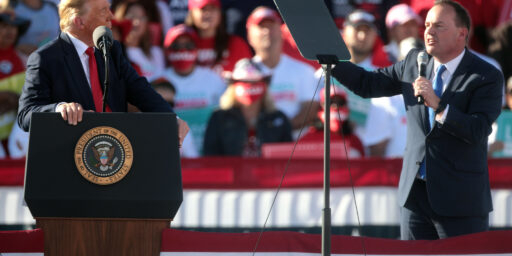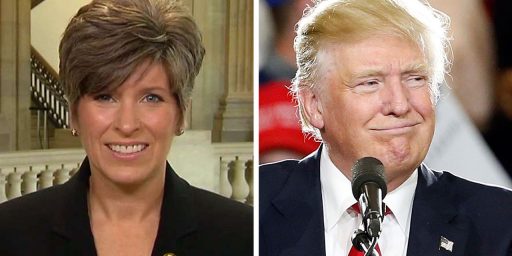No Intention of Running GM—Yeah Right
Via Tyler Cowen we get this news story.
The Obama administration will play a key role in reshaping General Motors’ board of directors over the next six months, potentially giving it even greater control in the management of the storied American manufacturer.
The president’s auto task force plans to consult with the company as it replaces a majority of its board, a White House official said. The board today largely consists of the current and former chiefs of major U.S. corporations such as Coca-Cola, Ernst & Young, Pfizer and Eastman Kodak. It is not known which of the 12 board members will leave.
The president said Monday that “the United States government has no interest in running GM.” But in practice it is already exerting tremendous influence over it, a situation that has triggered fierce debate over how much power the government should wield over the companies that it aids.
Well so much for that comment from President Obama. I guess being President of the United States wasn’t enough, he wants to be President of General Motors too.






I can’t wait to not be able to buy what I want…it’s gunna be great and green. Awesomeness.
Simple question Steve:
If you were President, GM came to you and said “save me,” and you believed you had the political need to do so – would you tell GM at all what to do? Or would you just become an endless money source for their current management?
(Putting GM through bankruptcy is a nice fantasy, but I am confident that no sitting President could let it happen.)
(Well, not raw bankruptcy. We may still yet get some soft-landing version.)
See, right there is the problem. Saving GM out of political need isn’t necessarily going to produce a healthy GM. In fact, the question should first be:
Can we save this patient?
If the answer is no, then why waste limited resources? Obama will becuase he has a political need. If the answer is yes, then it isn’t clear that politics is going to provide the best form of cure since what is politicially necessary does not have to be the same as what is economically necessary (for saving the patient).
Or think of it this way: how come government controlled industries never seemed to out do privately controlled ones? Look at the products of the former Soviet Union vs. the United States. Hell, they couldn’t even get their people enough toilet paper.
But WTF do I know. Lets let the politicians relearn that lesson.
Oh, and I don’t see the choices of “telling them what to do” and “and endless source of money” as being mutually exclusive. We could end up with both!
Agreed.
The Machieavellian truth, for a President of either party, is probably that a slow death at GM is better for that party’s future elections.
(I am not a President, so I can talk about how nice it would have been to break GM and auction the divisions in the beginning … but I have a feeling that if I were President my options would be more constrained.)
Here is political reality 101: The auto bailout started in the last administration- did you vote for that administration? I thought so. Now, if the current administration decided to pull the plug- would you vote for this administration in the future? I did not think so.
Well even in this case the idea that the government is going to “run” the company in hyperventilating at best. No one in the government is “running” anything. Obama didn’t “fire” Rick Wagner. GM asked for Government help, the government said sure but here are the conditions. If GM wanted to go it alone they could have.
As for government “run” operations it funny how you use USSR manufacturing as the comparison point. Try this on for size:
Look at the products of the current Peoples Republic of China vs. the United States. Hell, no one buys anything from them because they can’t compete with us.
Changes things a bit … no?
They can compete only in price. If price is the only concern, they win. If you need quality, they can’t compete.
I submit the government was alrady to all but the largest of degrees, running all the domestic car makers, by virtue of it being among the most heavily regulated industries on the planet.
I say once again, look at the companies that are being bailed out… each of them is already among the most heavily regulated around. The pattern suggests that the regulation is the cause.
So, in answer to the question:
No, I’d remove CAFE, I’d remove government regs basically enforcing the Union domination of those industries, I’d stop telling them what kind of cars to make, and let the market decide that, and I’d start producing more domestic oil to fuel them with. Giving them the freedom to solve their own issues, is by far more effective than trying to dictate to them what to do.
I supported the initial bailout because I thought the domestic automobile industry was too important to allow to fail without giving at least a few months effort to develop a plan for saving it. We’ve had a few months and I’ve not read anybody that has endorsed G.M.’s plan.
That’s how private bailouts are conducted. Your company is in trouble, you go the banks with a plan. If the plan passes the bank’s sh@t-detector, you’ll get the money with extensive protections for collateral and safeguards for money flows. You don’t go to the bank and say, we’ve screwed this up, why don’t you come in and run our widget factory. What do banks know about making widgets? What does the government?
The first, second and third problem is that G.M. has failed to produce the plan. The government isn’t in better position to make the plan, nor is a former director of Eastman Kodak.
Under the Obama misadminsitration, people in the know believe they know what is best for us. Those people being the ones who do not know Europe uses different formats for DVDs than we do, or phoney reset buttons might impress the Russians or there are 57 States or are unable to speak without a teleprompter or cannot keep a promise or sign legislation without ever reading it. These are the folks that intend to control industry so they will be able to dictate to the people what they can buy and how much it will cost. I think the second American Revolution will start pretty soon. I wonder if it will resemble a civil war or just a violent overthrow of the Government. I look forward to the rebirth of the committee on unAmerican Activities. They would be interested in the activities of one Barrack Hussein Obama of Kenya.
Bit’s right. Government has been and will continue to be the problem here.
Rick D. should recognize the PRC’s lower wage scales versus Detroit’s bloated wages and legacy costs. China competes on price with that advantage.
Packing the Board is as much running GM as sitting in the CEO’s office making the calls. This is a very serious power grab that will be written in the history books.
And the government is going to replace them with people lacking automotive experience. It’ll be a disaster!
Cars could be so much cheaper of liberals would just stop whining about asthma. Smog is patriotic! The government shouldn’t try to control what a corporation can expose me to involuntarily.
The Board of Directors runs the corporation; it doesn’t control the day-to-day operations.
But there has been effectively no CAFE. If you don’t want a car with high mileage, you just go over and buy a truck (or SUV) with low mileage.
That whole thing made it a sham that pleased one group, while angering another, and achieving nothing.
Toyota figured this out, and started making both the Prius and big pickup trucks.
BTW Bit, when you use “planet” figuratively you remind me that we don’t actually have the most regulated auto market by that measure. The Japanese (with costly inspection regimes) or the Europeans (with compliance tiers based on engine displacement) are much more complex.
(Shrug)
I suppose in reality that title goes to the Brits. Then again, a look at the condition of the British car industry just now, after years of it being run by government, furthers, not lessens my point.
(Maybe you want the auto regulation of say Mexico, that will keep the kids safe.)
I don’t even know what this mean. In the 19th century, the railroads were all build with massive government intervention — right of ways, outright land grants, tax incentives, etc. Is that private industry? Or a government initiative? Defense contractors live on government contract. What are they considered to be?
More broadly… companies get all sorts of government intervention: Patent protection, contract enforcement, regulation of utilities, anti-trust laws, international treaties, tax incentives, access to government-sponsored basic research… and on and on and on and on. And while we might wish all of these we perfectly neutral towards businesses, they aren’t.
In a modern state, there is not clear line between the government and business. There are a million governmental decisions that affect business on a day to day basis. Many of them for the good. Many for the bad. But I’d argue, on the whole, for the good.
The logic of your argument leads to… I don’t know where. What is your argument? It is okay for the government to shape the business environment, but not under and condition to step in and make any direct decisions — even when a firm is failing? What sense does that make? If the government is capable of making regulatory decisions, then why are managerial ones inherently off limits under all conditions? Or should the government be completely uninvolved — roll back to a pre-regulatory state? Or is your concern primarily a slippery-slope argument, that Obama is a closest Marxist whose ultimate aim is to nationalize private industry? I admit, I don’t get it.
The Obama administration has effectively usurped the ownership of GM from the stockholders. It may be said that GM was/is de facto bankrupt and therefore the stockholders’ claim is moot but no legal agreement or court decision has removed the operating decisions from the rightful owners and placed it in the hands of creditors or the government angel investor. I know of no condition of the government bailout that surrendered the right of the owners to elect the governing board of directors to run the corporation on their behalf. Was there a controlling interest clause?
If the government is removing duly stockholder-elected Directors and replacing them with their own hand-picked people not elected by the stockholders, then they have subverted the lawful ownership of the stockholders. The Obama administration is therefore running GM.
I wondered how long it would take for someone to invoke the now hackneyed cry of “It’s for the children!”.
In almost the words of a famous outlaw: “Liberals is so predictable!”
If there’s anything I’m sure of, it’s that.The concept of running anything without governmental control over it, seems to give you the slip each time.
JKB has a point, the government hasn’t bought a capital stake in GM like they did with the banks, they haven’t seized GM like they did IndyMac, and I don’t think there’s any legal framework to let them do it anyway. So is the government actually forcibly changing directors, or is this just another condition for future loans?
If GM can still say “no thanks” and go through bankruptcy without additional government loans, I don’t really have a problem with this. If the government is trying to change directors without the consent of a majority of the stockholders, then that’s a problem.
First of all, I’ll remind you that I’m a measured centrist, via politicalcompass.org
Next, go ahead and say you don’t want auto safety requirements “for the children” or lead in gasoline limits “for the children” and see how you do in the next election.
I can rest easy knowing that these things are so completely mainstream that anyone arguing against them is arguing against their own electoral success.
Oh, well in that case….
That is correct. It is the government’s mandate to regulate for the common good and they can even directly invest or encourage through tax laws the development of industries and businesses. But they may not exercise direct control over a lawfully run business in opposition to the owners by mandate. The government could have required they be given a controlling interest in GM in exchange for the bailout. They could by legislative fiat nationalize the business giving themselves operational control thus usurping the right of owners. The government could pass a law or regulation that makes a decision they desire inevitable. But absent some legal exchange of ownership rights, the direct managerial decisions remain with the owners. Of course, the government can use it’s powers of bribery (allocation of funds), coercion (threat of regulation or law) or intimidation (punishing taxes or loss of tax incentive as well as legal action) to influence those private individuals tasked with direct managerial decisions.
Thus Obama conditioned further government bailout on the resignation of the CEO rather than firing the CEO. The owners were not consulted as they could have voted to retain the CEO and risk bankruptcy without the government bailout. A decision the government was apparently unwilling to risk. In this case, the CEO bowed to government coercion and made individual decision that he could have taken no matter the desires of the stockholders. Could the stockholders contest the interference by the President, perhaps. But you can’t sue the government but should GM become a viable entity again, we may find out.
Bernard,
It is pretty obvious from the context Bernard. I was referencing industries like the one’s in the old Soviet Union. Maybe it would have helped your understandig if you had read the next sentence.
Oh, and I wasn’t talking about using private industry to achieve government’s objectives (e.g. transcontinental railroad, equipment for national defense, etc.) but industries that are outright controlled by the government. Odograph got the part right about political necessity. Decisions are not made on what is going to maximize profits, but what is going to maximize the political returns. I contend that different objectives will yeild different results. Not that shocking really.
Here is an example to help spell out the distinction (using your example Bernard so please don’t bitch about it):
Gov’t: We want a transcontinental railroad.
Railroads (RR): Sorry, we’d go bankrupt trying to build one.
Gov’t: We’ll give you some tax breaks and land grants.
RR: Oh, well okay then.
vs.
Gov’t: We want a transcontinental railroad.
Railroads (RR): Sorry, we’d go bankrupt trying to build one.
Gov’t: Fine, we are taking over your corporations, you are all fired and to Hell with the stockholders.
RR: !
You are not addressing my argument. You are addressing a strawman.
HTH, HAND.
You are the one making the strawman argument. Only an idiot would compare naming the board of directors of GM in today’s context to state industries in the old Soviet Union. It is the kind of comment that makes clear that you understand neither what Obama is doing today nor have any clue about how the old Soviet system functioned. Pathetic.
Part of the problem in any historical comparison is that corporations today are not what they were over a hundred years ago. Originally, corporations were joint public/private ventures, like the Commonwealth of Virginia.
If you wanted to form a company to build a canal, you had to lobby a legislature that would give you a limited duration charter. The charter would have a duration of 20-50 years in which the canal would be constructed and the company and its investors would have to make their profits before turning the canal over to the government (or the canal might be sold at auction). The charter laid out a plan of business which had to be strictly followed and delegated state powers in furtherance of it.
The problem with the old corporate forms (and they were not popular) was the public perceived them as cesspools of corruption. Regular people didn’t get charters; the connected did. We’ve replaced that form with general corporations of indefinite term and character. Anybody can form a corporation for any reason, so long as they follow general rules. The corporations don’t get delegated state power.
“Only an idiot would compare naming the board of directors of GM in today’s context to state industries in the old Soviet Union.”
Huh? What’s wrong with making a comparison? Government rather than owners with a direct financial stake of their own money in both cases. Political rather than business considerations at play when making decisions in both cases. The wrong interests, motivations, and consequences in both cases. I can see many ways to rationally compare the two.
I’m not sure about this. Didn’t Truman get slapped down for trying to nationalize the steel industry? The government could declare G.M. insolvent and put it in receivership for an orderly distribution of assets. But I’ve not read an example of the type of nationalization that seems to be popular.
" I guess being President of the United States wasn’t enough, he wants to be President of General Motors too."
To a socialist's like President Obama, it's all one in the same.
Stuff what is left of your personal freedom and wealth under your pillow. This ain't going to be pretty.
" I guess being President of the United States wasnt enough, he wants to be President of General Motors too."
To President Obama, it's all in the same. The big G controls everything.
Someone please email this man a copy of the US Constitution.
Well, it is kind of funny when you measure out as a centrist, and someone calls you a “typical conservatie” or “typical liberal”.
It shows where they are standing, right? So far over that the center looks like the other side.
I know what you mean. I took one of those Facebook quizzes that said I was Ulysses S. Grant, but nobody believes that either.
Yea, uh, no, not really.
The thing is, the political spectrum isn’t linear, it’s more of a circle, and you’re as much on the edge of it as anyone else. Don’t let any online quiz tell you otherwise.